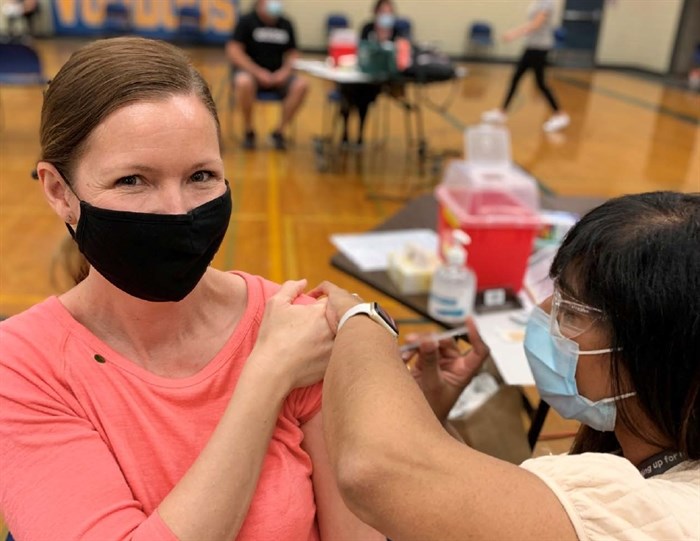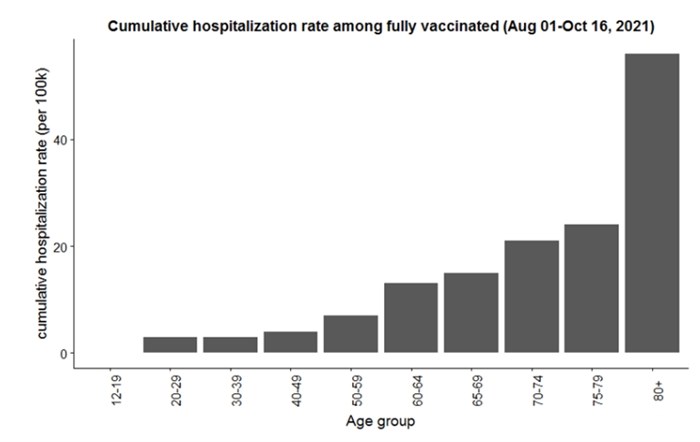
FILE PHOTO
Image Credit: SUBMITTED/Interior Health
October 27, 2021 - 1:30 PM
Provincial health authorities have made a big deal out of the fact that the vast majority of people getting COVID-19 and being hospitalized with it are unvaccinated.
But, what has been less talked about is the fact that, in early September, about 21% of new cases were in people who were fully vaccinated. That’s grown to 36% of new cases in the week of Oct. 18-24.
Similarly, in early September, 16% of hospitalizations were people who were fully vaccinated. That grew to 23.8% for the two-week period from Oct. 11-24, the most current data available.
Yesterday, Oct. 26, Provincial Health Officer Dr. Bonnie Henry cast some light on who is most likely to get infected and sick even though they are fully vaccinated.
“The biggest risk being age,” she said during a news briefing. “We know the older we are, we don’t mount as strong an immune response to vaccinations.”
She presented a bar chart that showed, from Aug. 1 to Oct. 16, fully vaccinated people over the age of 80 living in the community were hospitalized at a rate of about 60 people per 100,000 population.
That dropped to about 23 per 100,000 in the 75-79 age group and about 20 per 100,000 in those aged 70-74.
Those ratios dropped steadily for younger age groups.

Image Credit: Submitted/B.C. Ministry of Health
But age is not the only factor.
The length of time between first and second doses also has an impact. Countries like the U.S. and Israel, along with provinces like Alberta and Ontario, stuck strictly to recommendations from vaccine manufacturers to give second doses four weeks after the first dose.
In B.C., Dr. Henry choose to wait, initially, five weeks between doses so more people could get a first dose of vaccine. That was at a time when vaccines were in short supply and, she argued, one dose gave a reasonable amount of protection, especially for residents of long term care homes who were particularly hard hit.
READ MORE: .B.C. to still administer second doses despite loss of Pfizer shipment next week: Dix
Since then, it’s been shown that a longer interval between doses – six to eight weeks – gives stronger, longer lasting protection.
“We have good, strong immunity for most people but some people who got their doses early – and when we look back at our program, we started with those who were most at risk, the seniors and elders in long term care, our seniors in the community, indigenous populations where we were seeing higher rates of transmission and infection and severe illness – those people were more likely to get a shorter dose interval as well,” Dr. Henry said. “Those are the people who are at higher risk of having decreased protection now and at higher risk of having severe illness.”
The province has already started offering booster shots to those groups along with those considered clinically extremely vulnerable.
Yesterday, Dr. Henry announced that booster shots will be offered to all residents over the next few months.
Half a million people over the age of 70 should be able to get a third vaccine dose by the end of the year.
For the rest of the population, it’s expected to take to May 2022.
READ MORE: All B.C. residents will be able to get COVID booster shots
From the beginning, vaccine manufacturers never claimed they would be 100% effective.
The B.C. Ministry of Health told iNFOnews.ca, in an email, that the Pfizer and Moderna vaccines have proven to be 90% effective.
As of yesterday, 3,918,385 B.C. residents were fully vaccinated, meaning the vaccine is not likely effective for more than 390,000 people.
To contact a reporter for this story, email Rob Munro or call 250-808-0143 or email the editor. You can also submit photos, videos or news tips to the newsroom and be entered to win a monthly prize draw.
We welcome your comments and opinions on our stories but play nice. We won't censor or delete comments unless they contain off-topic statements or links, unnecessary vulgarity, false facts, spam or obviously fake profiles. If you have any concerns about what you see in comments, email the editor in the link above.
News from © iNFOnews, 2021